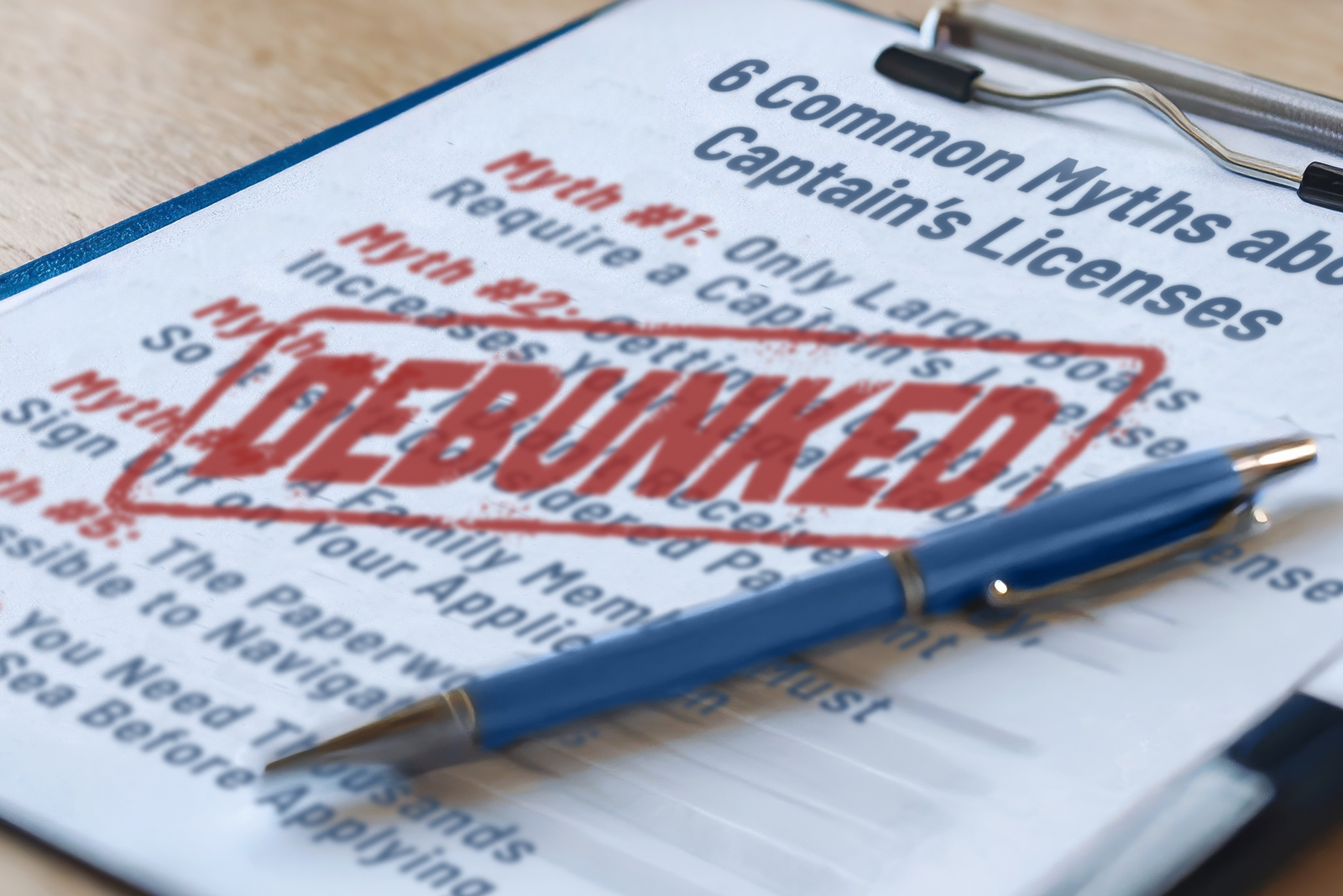Free Shipping On Orders $50+
Free Shipping On Orders $50+

6 Common Myths and Misconceptions About Earning a Captain’s License: Debunked
by Bob Figular April 15, 2025
If you’ve been around the boating community for a while, you’ve probably heard all sorts of claims about what it takes to get your captain’s license. Fortunately, many of these claims are just plain wrong.
After helping boaters earn their licenses for over two decades, I’ve heard just about every misconception imaginable. Today, I’m going to clear the waters and debunk the most common myths about captain’s licenses that might be holding you back.
My Experience Helping Aspiring Captains
Mariners Learning System has been in business since 2002, and in 2005, we became the first school approved by the Coast Guard to teach in an online format. In the 20+ years since we opened our doors, we’ve taught over 200,000 students with a remarkable 98.7% pass rate.
What sets us apart from most in our industry is that we teach more than just memorization for a test; we teach understanding. This approach has had a profound impact on the success our students enjoy.
Because of my passion for maritime education, I don’t want to let captain’s license misconceptions persist, potentially derailing future learners before they even get started.

6 Common Myths About Captain’s Licenses
Myth #1: Only Large Boats Require a Captain’s License
This is perhaps the most widespread myth I hear. Let me be clear: The size of your boat alone does not determine whether you need a captain’s license. The Coast Guard requires a license based on the use and purpose of the vessel, not its dimensions.
Say you just bought a 65-foot boat. If you asked me what type of license the Coast Guard required for it, I’d ask how you’re using it. If you’re only taking out friends and family for recreational purposes, the Coast Guard doesn’t require you to have a captain’s license.
Conversely, if you bought a 19-foot center console and planned to take people out for fishing charters, you would absolutely need a captain’s license, regardless of the boat’s modest size.
The rule is simple: If you’re operating commercially, or for hire, you need a captain’s license, typically an OUPV/Six-Pack or a Master’s license.
Myth #2: Getting a Captain’s License Increases Your Legal Liability
I hear this concern regularly, and it simply isn’t true. A captain’s license does not increase your legal liability on the water. It just formalizes what you’re already responsible for.
Regardless of your licensing status, you must follow all maritime laws and regulations when you’re out on the water. The Coast Guard doesn’t put an asterisk next to those rules that says “unless you’re unlicensed.” If something goes wrong, claiming ignorance as an unlicensed boater won’t help you.
Think of getting a captain’s license like getting a driver’s license. Whether you’re driving a car or sailing a boat, you have to follow the rules to keep everyone safe. The license simply confirms that you have the knowledge, preparation, and ability to do so.
Myth #3: I Didn’t Receive Money, So It Isn’t Considered Payment
This one is a treacherous misconception that can lead to hefty fines. If you receive compensation from passengers on your boat, then you must have a captain’s license.
The US Coast Guard defines “compensation” as “financial consideration,” which carries a very broad definition. It’s not limited to direct monetary payments but includes any economic benefit, barter, or exchange of services.
For example, if you offer to take a friend and their family out on your boat in exchange for a round or two using their fancy golf villa, that’s considered compensation. If you get caught without a captain’s license in this scenario, you’ll face a $5,000 fine for every instance.
Myth #4: A Family Member Must Sign Off on Your Application
Some people think they have to be born into a maritime family to get a captain’s license. This couldn’t be further from the truth. You do not need your father, grandfather, or another licensed captain to sign off on your boating experience. You can do that on your own.
Having a family background in the maritime industry may prove helpful in some ways, but it absolutely is not a requirement. Most successful captains start with no prior experience and learn everything through training and hands-on experience.

Myth #5: The Paperwork Is Impossible to Navigate
Captain’s license paperwork can be daunting, but it’s far from impossible. Plenty of guides, courses, and professionals (including us) will help you through the process.
I like to approach what is, admittedly, a lot of paperwork by breaking it down into a series of smaller steps. If you take each requirement one at a time — CPR certification, first aid training, drug test, physical, documented boating experience — it becomes much more manageable.
Myth #6: You Need Thousands of Days at Sea Before Applying
While boating experience is essential, you don’t need thousands of days on the water to apply for your captain’s license.
Different licenses have different requirements, but a minimum of 360 days of boating experience is the entry point for most licenses, including the popular OUPV Six-Pack and Master’s licenses.
More good news: a “day” of experience doesn’t mean you have to be out from dawn till dusk. The Coast Guard considers four hours on the water as one “day,” so 360 is more achievable than it might initially sound.
Common Myths About Captain’s Licenses: Debunked!
Now that we’ve cleared up these common myths about captain’s licenses, I hope you can see that earning yours is more accessible than you thought.
Whether you’re looking to start a new career or simply deepen your boating knowledge, don’t let popular misconceptions hold you back from pursuing your captain’s license dream!
Leave a Comment
Comments will be approved before showing up.
